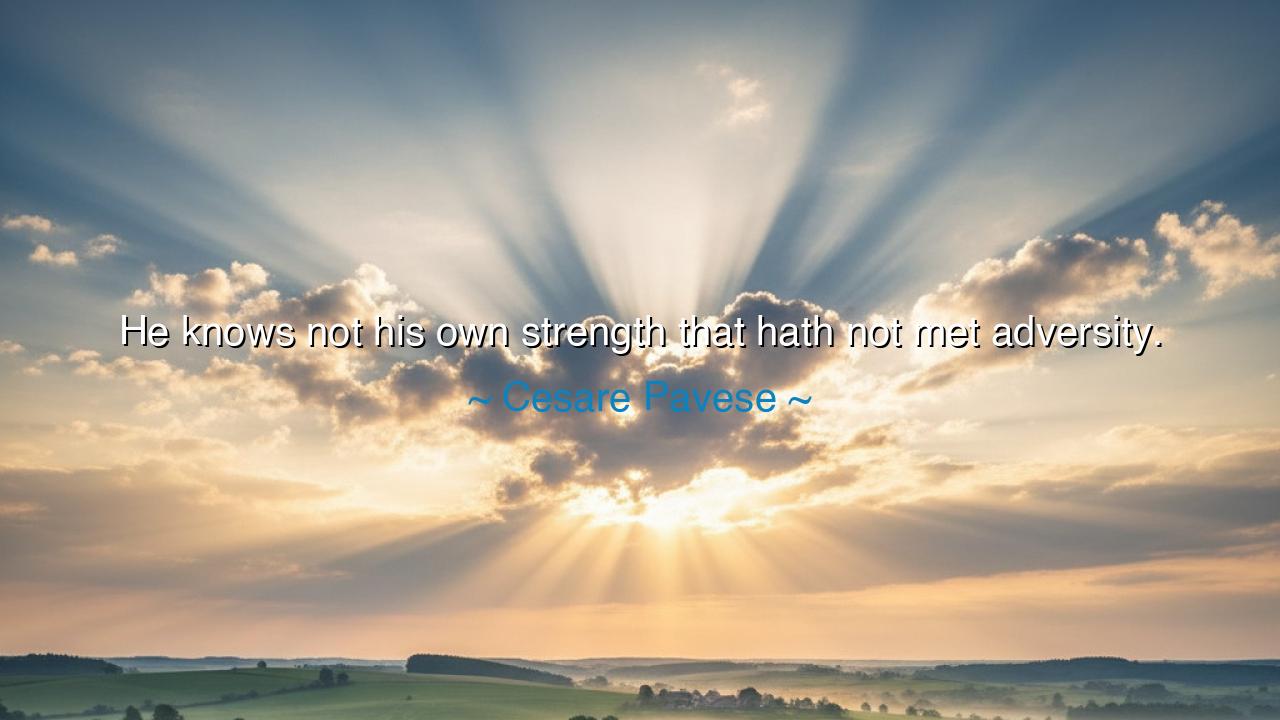
He knows not his own strength that hath not met adversity.






Hear the solemn words of Cesare Pavese, a man who knew sorrow deeply and yet saw in it a mirror of the human soul: “He knows not his own strength that hath not met adversity.” These words speak with the weight of ages, for they remind us that strength is never truly revealed in ease, but only in trial. A man may boast of power when the sea is calm, yet when the storm rages and the mast cracks, then and only then does he discover what lies within him. Adversity is the crucible in which the hidden metal of the spirit is tested and revealed.
The origin of this saying is born of Pavese’s own life, scarred by hardship. An Italian poet and novelist of the twentieth century, he endured political persecution, imprisonment, and profound loneliness. His words carry the authority of one who walked through suffering and saw that pain strips away illusions. Pavese knew that comfort deceives us into thinking we are strong, while trial unmasks both our weakness and our hidden resilience. Thus, his teaching flows from lived truth: we cannot know our strength until life has demanded it of us.
History gives us countless witnesses to this law. Consider the life of Nelson Mandela, who spent twenty-seven years in prison, cut off from family and freedom. Many would have been broken by such adversity, yet Mandela discovered in that darkness the strength of forgiveness, the resilience of patience, and the power of unyielding hope. When he emerged, he was no longer just a man, but a symbol for his nation. Without adversity, his strength would have slumbered unknown; through adversity, it became light for millions.
There is here also a warning against arrogance. Those who have not faced hardship may imagine themselves strong, but theirs is the confidence of the untested. Like untempered steel, it gleams yet shatters under pressure. Only through trial and endurance does strength become real, forged in fire and hammered into resilience. Thus, Pavese’s words remind us that adversity, though bitter, is also a gift—it awakens us to powers within that we never suspected.
The heart of this teaching is that strength is not given, but discovered. It is not something we can measure in quiet days, but something revealed when all else fails. When health falters, when wealth crumbles, when friends depart, when death draws near—then, in those hours, we either collapse or rise. And when we rise, even trembling, we learn that we are far stronger than we imagined. This knowledge becomes a treasure we carry forever, for it cannot be taken from us.
Consider also the tale of Helen Keller, blind and deaf from childhood. Without sight, without hearing, her world seemed bound in silence and darkness. Yet through immense struggle, she learned to communicate, to write, to inspire. She herself admitted that adversity revealed her power, for without it she would never have discovered the depths of her courage and the breadth of her influence. Through her, Pavese’s words shine with living proof: strength sleeps until adversity awakens it.
The lesson for us is clear: do not curse adversity, but recognize in it the forge of your true strength. When trials come, meet them not with despair but with openness, knowing they will reveal what you are truly made of. Do not fear hardship, for it is the teacher of resilience, the awakener of courage, the revealer of your hidden depths. Each challenge is an invitation to discover yourself anew.
Thus, O seeker, remember Pavese’s wisdom: he who has not met adversity knows not his own strength. Do not envy the easy path, for it breeds weakness; instead, walk boldly through trial, for it will show you the power you already possess. Embrace adversity not as an enemy, but as the stern master that teaches you who you are. For in the fire of trial, strength is revealed—and in that revelation, the soul is made unbreakable.






AAdministratorAdministrator
Welcome, honored guests. Please leave a comment, we will respond soon